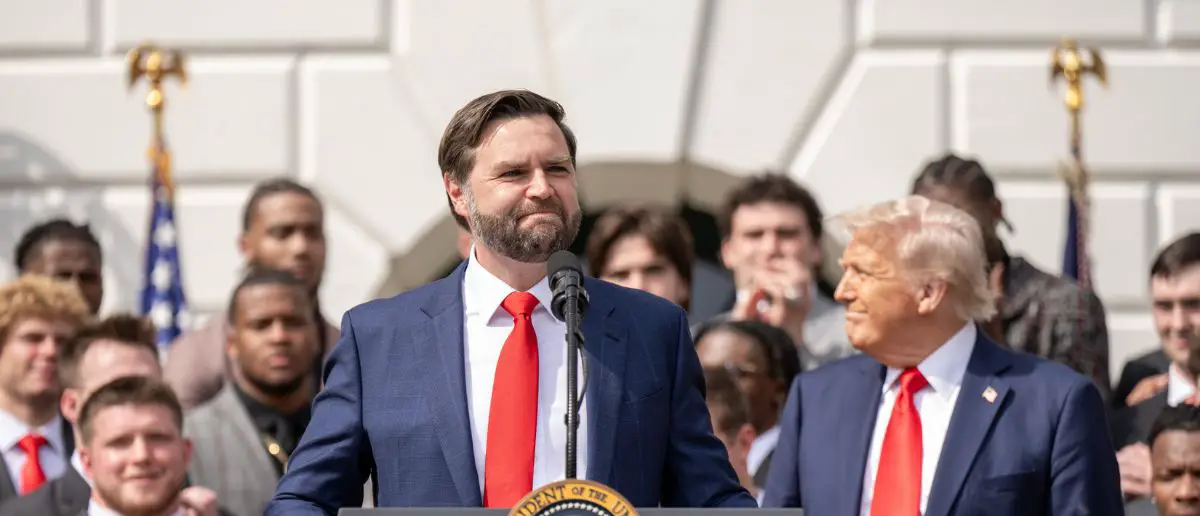
The upcoming midterm elections could change everything. It just might derail Donald Trump’s agenda.
That’s why this U.S. Senate news has thrown a huge wrench into the critical 2026 midterms.
A leading super PAC backing Senate Republican candidates shattered fundraising records in the first six months of 2025, signaling strong momentum as the party aims to bolster its slim three-seat Senate majority in the 2026 midterms. The Senate Leadership Fund (SLF), aligned with Senate Majority Leader John Thune, along with its sister organization One Nation, amassed $85 million since January—more than twice the amount raised during the same period in 2023.
This unprecedented fundraising surge comes as Republicans work to protect and expand their Senate control while promoting the achievements of President Donald Trump’s One Big Beautiful Bill Act, narrowly passed by the Senate and signed into law on July 5, 2025. This fundraising milestone marks the first such period under Thune’s leadership, following his replacement of Kentucky Senator Mitch McConnell as Senate Republican Leader in January. Axios initially reported the impressive financial gains of SLF and its affiliates in early 2025.
Thune’s groups have already started investing in key battleground states, including Georgia, North Carolina, Maine, Alaska, and Nebraska, according to Axios. Republicans are poised to allocate significant resources to challenge Georgia’s Democratic Senator Jon Ossoff, seen as the most vulnerable Democrat up for reelection. Representing a state Trump won in 2024, Ossoff has consistently opposed Trump’s legislative priorities, including the recent tax and immigration package, and has expressed support for impeachment efforts against the president.
In North Carolina, no prominent candidate has emerged for the Republican primary since Senator Thom Tillis announced he would not seek another term. President Trump has indicated he would endorse his daughter-in-law, Lara Trump, should she decide to run for the open seat.
Lara Trump, a Fox News Saturday night host, discussed Senate Republicans’ efforts to advance Trump’s agenda with Thune in a May interview and has previously considered a Senate candidacy.
SLF and its affiliates are also gearing up to fiercely defend the seat of Maine’s Republican Senator Susan Collins, a five-term incumbent who has not yet confirmed her reelection plans.
The fundraising powerhouse will soon launch ad campaigns in Texas to support Senator John Cornyn, who faces a challenging primary against Texas Attorney General Ken Paxton. Recent polls show Paxton leading Cornyn by double digits with nine months until the primary, per Axios.
Thune, alongside National Republican Senatorial Campaign Chairman Tim Scott of South Carolina, has publicly backed Cornyn’s reelection effort. SLF and its allied groups plan to highlight Trump’s signature legislation in competitive states as the midterms approach.
Polling conducted by One Nation shows strong voter support for key elements of Trump’s bill in battleground states. Only 12% of likely voters in Georgia, Maine, Michigan, and North Carolina oppose making the 2017 Trump tax cuts permanent or other tax relief measures when framed as a “working family tax cut.”
Before the bill’s passage, Thune told the Daily Caller News Foundation in June that he urged Senate Republicans and GOP organizations to aggressively promote its benefits.
“These provisions are incredibly popular when you break them down,” Thune said in the interview. “I’m hopeful our members will get out there and communicate this boldly, as it will resonate deeply with American voters.”
2026 Midterms and Their Impact on the 2028 Presidential Election
The 2026 midterm elections are shaping up to be a pivotal moment for American politics, with far-reaching implications for the 2028 presidential race, where President Donald Trump will be absent from the ballot due to term limits. The Trump administration’s ambitious legislative agenda, particularly the One Big Beautiful Bill Act, has set the stage for a high-stakes electoral battle that could determine the political landscape for years to come. The robust fundraising efforts by groups like the Senate Leadership Fund demonstrate the Republican Party’s determination to maintain and expand its Senate majority, a critical factor in shaping the 2028 election.
Historically, midterm elections serve as a referendum on the sitting president’s performance. With Trump’s second term underway, the 2026 midterms will test the public’s reception of his policies, which have delivered tax relief and increased funding for border security and defense. The success of these initiatives, as highlighted by recent polling showing strong support for tax cuts in battleground states, could bolster Republican prospects. However, Democrats are eager to capitalize on any perceived missteps, particularly the controversial Medicaid cuts in Trump’s bill, which they plan to weaponize in their campaigns.
The Senate map for 2026 presents a challenging but favorable opportunity for Republicans. With 20 of the 33 seats up for election held by Republicans, compared to 13 Democratic seats, the GOP faces a defensive posture but benefits from a map tilted toward red states. Key races in Georgia, Michigan, and Maine will be critical. In Georgia, Democratic Senator Jon Ossoff faces a tough reelection bid in a state Trump carried in 2024, making him a prime target for Republicans. The absence of a strong GOP challenger like Governor Brian Kemp, who declined to run, leaves the field open but competitive.
In Michigan, the open seat left by retiring Senator Gary Peters offers Republicans a chance to flip a state Trump narrowly won in 2024. Maine’s Senator Susan Collins, a moderate Republican, faces a difficult race in a state that voted for Kamala Harris in 2024, but her proven resilience in past elections makes her a formidable incumbent. These races will not only determine Senate control but also set the tone for 2028, as a strong Republican Senate majority could pave the way for a GOP presidential candidate to build on Trump’s legacy.
The House of Representatives, where Republicans hold a razor-thin majority, is another battleground with significant implications for 2028. Historical trends suggest the president’s party often loses House seats in midterms, and Democrats need only a few flips to regain control. A Democratic House could stymie a Republican president’s agenda in 2028, creating gridlock and potentially boosting Democratic momentum heading into the presidential election. Conversely, a Republican hold on the House would provide a bulwark for a GOP administration, allowing it to advance Trump’s policy framework.
The absence of Trump on the 2028 ballot adds an intriguing dynamic to the midterms. Vice President JD Vance, a likely contender for the GOP nomination, is expected to campaign heavily in 2026 to bolster Republican candidates, raising his national profile. His success in rallying Trump’s base could position him as a frontrunner in 2028, but a poor midterm showing might weaken his prospects. Similarly, other potential Republican candidates, such as Lara Trump, could use the midterms to establish themselves as heirs to Trump’s movement, particularly if they secure high-profile wins like the North Carolina Senate seat.
Democrats, meanwhile, face internal challenges as they prepare for 2026 and 2028. The party’s struggles to reconnect with working-class voters, coupled with low approval ratings for congressional Democrats, could hinder their midterm performance. Potential 2028 presidential contenders like Kamala Harris, Pete Buttigieg, and Andy Beshear will use the midterms to build their national profiles, but a weak showing could dampen their prospects. The Democrats’ ability to frame Trump’s policies, particularly the Medicaid cuts, as harmful to vulnerable Americans will be crucial to their success.
The Trump administration’s focus on delivering campaign promises, such as tax cuts and border security, has energized the Republican base, as evidenced by the Senate Leadership Fund’s record-breaking fundraising. This financial advantage, combined with strategic ad buys in battleground states, positions Republicans to mount a formidable defense of their Senate majority. The One Big Beautiful Bill Act, despite its controversies, has been framed by GOP leaders like Thune as a win for working families, a message that resonates in key states and could mitigate potential backlash.





